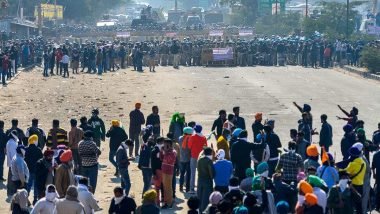
Tomorrow, on February 16, several farmers’ unions, including the Samyukta Kisan Morcha (SKM), are set to initiate a Gramin Bharat Bandh or nationwide strike to emphasize their demands to the central government. Despite hurdles faced by hundreds of farmers at the Punjab-Haryana border near Ambala, who were met with tear gas from Haryana security forces, the call for Bharat Bandh remains firm.
The strike, scheduled from 6 am to 4 pm, is expected to affect various sectors across the country. Transportation, agricultural activities, Mahatma Gandhi National Rural Employment Guarantee Act (MGNREGA) works, private offices, village shops, as well as rural industrial and service sector institutions are likely to remain closed in solidarity with the farmers’ cause.
However, essential services such as ambulance operations, newspaper distribution, medical shops, and students attending board exams are expected to function normally, minimizing disruption to crucial daily activities.
The primary demands of the protesting farmers revolve around ensuring a Minimum Support Price (MSP) for their produce, strengthening the MGNREGS, reinstating the old pension scheme, and guaranteeing pension and social security for all workers, both in the formal and informal sectors. The SKM has specifically urged for MSP based on the Swaminathan formula of C2 50, along with debt waivers, no hike in electricity tariffs, and other measures to support agricultural livelihoods.
Regarding the government-appointed panel on MSP formed after the 2021 farmers’ protest, there seems to be little progress, prompting the farmers to intensify their agitation.
Public support for the farmers’ cause has been significant, with intellectuals and artists issuing a joint statement endorsing the nationwide strike. Notable signatories include economist Prabhat Patnaik, historian Irfan Habib, journalist P Sainath, among others. The statement emphasizes the unity between farmers and workers against what they perceive as the government’s pro-corporate, anti-people policies.
The ongoing ‘Dilli Chalo’ protest, where farmers from Punjab are aiming to march towards Delhi, has further intensified tensions. The Delhi Police’s preparations, including the acquisition of over 30,000 tear gas shells, indicate the potential for confrontation as authorities seek to prevent the entry of protesting farmers into the national capital.
This nationwide protest comes in the wake of the 2020 farmers’ protest, which lasted over a year, highlighting the persistent grievances within the agricultural community. As farmers continue to mobilize, the government faces mounting pressure to address their concerns and find a resolution to the ongoing impasse.
Sources By Agencies

